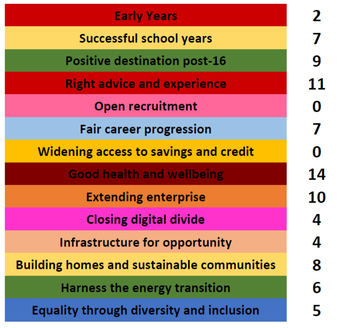|
How social enterprises in Plymouth are smashing the Levelling Up goals Here at Iridescent Ideas CIC and Plymouth Social Enterprise Network (PSEN) we often say that we think social enterprises are better for people and better for planet. Better than ‘standard’ profit making businesses, that is, because social enterprises put achieving a social or environmental goal ahead of, or alongside making a profit. In a previous article we turned to the United Nations Sustainable Development Goals (SDGs) for help looking at this issue with an international perspective. This time round we are looking at the United Kingdom’s Levelling Up Goals (LUGs). Social enterprises are fundamentally driven to achieve a good cause; it is written into their governance, their company DNA if you like, and it is not a corporate social responsibility style bolt-on, optional extra. Where’s the proof? BUT, where is the proof that social enterprises are better? How might we begin to capture and report on any impact to back up our claims? Aggregating the social value of social enterprises is notoriously tricky - all businesses do things slightly differently. There is no standard way of assessing social impact; methodologies vary; there is little external audit to verify impact claims. These are some of the conundrums that need to be considered. The UK’s Levelling Up Goals The United Kingdom’s Levelling Up Goals (LUGs) are aims that have been put together by The Purpose Coalition - a group of businesses, NHS Trusts, Councils, universities and politically cross-party representatives which examined issues here in the UK. There are fourteen goals covering themes such as strong early years foundations; successful school years; fair career progression; good health and well-being; extending enterprise; closing the digital divide; housing and communities; achieving equality and more. The coalition reports that these goals are being adopted by organisations including Amazon, UK Power Networks, BP, Sodexo, Pennon Group, Adecco, the BBC, Direct Line Group and CISCO and others. Mapping social enterprises contribution to the Levelling Up Goals There’s been a lot of talk about ‘levelling up’ the country. The government produced the Levelling Up white paper in February of this year and a bill in May. This paper set an ambitious vision of ending geographic inequality and enabling everyone to share equally in the nation’s success. We’ve written a response to that wider report here. Somewhat surprisingly, in our view, the report did not reference the goals that were set out by the Purpose Coalition group. However, some of the themes were common and we liked the way the LUGs used a similar architecture to the UN goals. We felt that the LUGs might be another useful vehicle to get the social enterprise message across; joining the dots between social enterprise and a UK framework for social impact. Also, the LUGs feel more accessible and more directly relevant than the global goals which contain a lot of international aims and national government targets. As a first step, we mapped the work of thirty-three PSEN members to the LUGs. These organizations were chosen because they had publicly available records that show what they had done and achieved. We looked at regulated social enterprises which were either charities, community benefit societies or community interest companies. We accessed the most recently filed accounts at Companies House, the Charity Commission or the Financial Conduct Authority for each business. For Community Interest Companies (CICs), we accessed their CIC34 – an annual ‘Community interest company report’ - which provides a general description of the company’s activities and impact for the most recent year. For charities and community benefit societies we accessed similar annual reports held with their respective regulators. This information was used to map those PSEN members against the relevant goals. We allocated a primary goal to the organization’s work and then several secondary goal where their endeavours overlapped other areas. The results You can see from the chart below that ‘Good Health and Well-being’ was the LUG most likely to be supported by the PSEN members we looked at with 14 social enterprises contributing. This was followed by ‘Right Advice and Experience’ with 11 social enterprises and ‘Extending Enterprise’ with 10 businesses. Other LUG areas with a strong showing were ‘Positive Destination Post-16’ with 9 firms; ‘Building Homes and Sustainable Communities’ (8) and Successful School Years (7). Don’t forget that, often, social enterprises work across more than one LUG so the total here is more than thirty three. In our view the indicators for the LUGs need further work to deepen their significance and widen their interpretation. For example, Right Advice and Experience is described as: “accessing advice…to unlock opportunity throughout a persons life” yet the indicators related solely to schools’ Gatsby benchmarks.
From the data we could gather – on openly published, regulatory statements - we could find no social enterprises in our sample that were primarily driven by Open Recruiment or Access to Savings and Credit (following the sad closure of the Plymouth Credit Union). This is not to say social enterprises tackling these issues don’t operate in the city. There are an estimated 200 social enterprises in Plymouth but they were not all in our targeted sample. Clearly more detailed research is needed to fill in any gaps. What is this telling us? It’s clear there is a broad spread of work by social enterprises in Plymouth that is contributing to most of the LUGs. This tantalisingly hints at the answer to the question – what is the collective impact of social enterprises in Plymouth: the impact looks broad and is covering key issues that are important to our city and to the country. However, in this research we have not looked at the depth or quality of a social enterprise’s work - only the nature of the work. More research is needed We need to find out a lot more information to make a clearer judgement about whether social enterprises are better for people and planet using the LUGs as a framework. We need to:
Summary The LUGs are an emerging, cross-party, cross-sector and broadly recognized framework. They provide a useful way to assess social enterprise activity and impact here in the UK. Social enterprises clearly contribute to these inspiring UK-wide goals. How much they do so is still up for debate. With more data and a deeper look at quality we think we really could begin to show more definitively that social enterprises are better for people, communities and the environment of the UK. Watch out for part 3 of this research where we look at how social enterprises are contributing to the Reducing Inequality SDG – an area that the UN and many others see as a key area that needs progress.
0 Comments
Leave a Reply. |
AuthorsGareth Hart Archives
June 2024
Categories
All
|


 RSS Feed
RSS Feed
